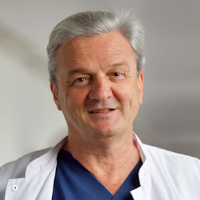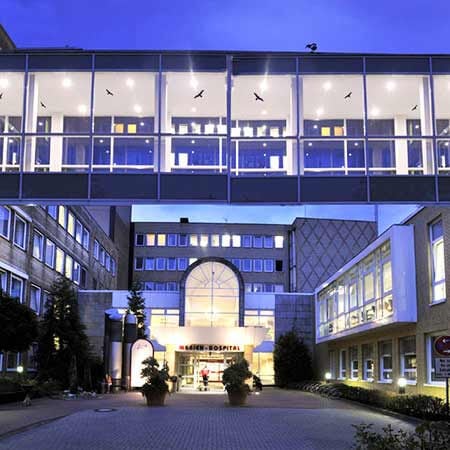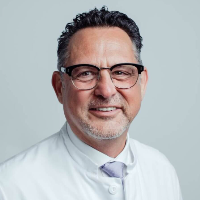Radical Prostatectomy for Prostate Cancer Treatment in the Best Hospitals in the World
Treatment prices are regulated by national law of the corresponding countries, but can also include additional hospital coefficients. In order to receive the individual cost calculation, please send us the request and medical records.
Prostate Cancer Treatment
- Diagnostics
- Prostate cancer | PSMA-PET
- Radiation therapy
- High intensity focused ultrasound (HIFU)
- Brachytherapy
- Transurethral electroresection
- Lutetium-177 PSMA (Lu-177)
- Da Vinci prostatectomy
- Intensity-modulated radiation therapy (IMRT)
- Proton Therapy
- Irreversible electroporation (NanoKnife)
- Photodynamic therapy

Department of Adult and Pediatric Urology, Andrology
The Department of Adult and Pediatric Urology, Andrology offers the full range of services in the areas of its specialization. Men and boys with diseases of the reproductive system can be diagnosed and treated in the medical facility. Doctors also treat infertility and erectile dysfunction. Medical care is provided to men and women with diseases of the urinary system, namely kidneys, ureters, bladder, and urethra. The department is certified as the Prostate Cancer Center by the German Cancer Society (DKG), which indicates the excellent quality of the services provided in this area. The department's urologists have a perfect command of the innovative treatment methods, including holmium laser enucleation of the prostate (HoLEP), photodynamic therapy, and da Vinci robot-assisted surgery. The department employs comprehensively trained and experienced doctors who apply advanced medical achievements in their practice. Each patient is provided with an individual approach, considering their specific needs and wishes.







Department of Adult and Pediatric Urology, Andrology
The Department of Adult and Pediatric Urology, Andrology offers the full range of diagnostic and therapeutic services for patients with diseases of the urinary system and for men with pathologies of the reproductive system. The team at the medical facility also admits children and adolescents with urologic diseases. The department has 62 beds for inpatient treatment. Therapeutic options include both conservative and surgical techniques. Many operations are performed using the innovative da Vinci surgical system. The department also successfully uses modern laser systems, including the GreenLight laser, a holmium laser, a thulium laser and the laser for water vapor thermal therapy. The key focus of the department's work is on cancer surgery for malignant diseases of the prostate, bladder, kidneys, and testicles. The department also specializes in the treatment of urinary incontinence and pediatric urologic pathologies. Prostate diseases are treated in a specialized center certified in accordance with the DIN EN ISO 9001 requirements.




Department of Urology
The Department of Urology offers the full range of diagnostics and treatment in this medical field. The department's doctors have excellent qualifications in the treatment of diseases of the kidneys, urinary tract and reproductive organs in men. Of particular interest is the treatment of malignant urological neoplasms, which include prostate cancer, testicular cancer, kidney and bladder cancer. The department has in its arsenal many effective conservative and surgical treatment techniques, which can fully restore men's health.



Prostate cancer is a slowly progressing disease. Nevertheless, in long-term absence of treatment cancer can grow into adjacent organs and structures, as well as give regional metastases in lymph nodes near the organs. Tumor cells can be transferred via the bloodstream to distant organs (bones, lungs, liver, etc.) and give origin to new distant metastases.
Treatment of prostate cancer with radical prostatectomy
The main treatment for localized prostate cancer is surgery. The goal of prostate cancer surgery according to the generally accepted oncological principles is the maximum radicality, which means the complete removal of the tumor, the affected organ, and regional lymph nodes.
A radical prostatectomy is surgery for complete removal of the prostate gland and seminal vesicles. It also removes lymph nodes in the pelvic area. This is done in order to prevent the spread of cancer from the prostate gland to other parts of the body.
A tumor can be suspected already during the urological examination. Palpation allows you to suspect the presence of pathological tissue proliferation. Ultrasound confirms the suspicion of a tumor. However, a biopsy is done to determine if it is benign or malignant. A prostate-specific antigen (PSA) blood test is used for the additional diagnosis confirmation.
The degree of tumor malignancy is determined by the Gleason scale. The technique helps to find out how differentiated the cells of neoplasm are. There may be indicators from 2 to 10. The higher the indicator is, the less differentiated the tissues are, and the more aggressively the tumor will develop.
These scales directly influence the choice of medical treatment method. For actively developing formations, chemotherapy and radiation therapy are considered more effective and can be performed instead of resection.
Types of radical prostatectomy
Open radical prostatectomy
In open prostatectomy, the surgeon makes an incision from the pubic bone towards the navel. After that, the pelvic lymph nodes are removed first, then the prostate gland, and then the adjacent affected tissues.
Laparoscopic radical prostatectomy or robotic radical prostatectomy
In the laparoscopic radical prostatectomy or robotic radical prostatectomy, several small incisions are made in the abdomen during the surgery. A laparoscope is then inserted through one of the incisions and the abdomen is expanded with gas. The prostate gland is removed through other incisions, using surgical instruments.
When is radical prostatectomy the right for prostate cancer treatment?
Prostate cancer surgery might be the best choice for patients with high risk of further cancer progress, as well as for those who are healthy, younger than 70 years old, for those, who understand and accept the risks and side effects associated with the chosen type of cancer surgery and want to remove cancer.
In addition to the common risks associated with surgery, prostate removal is associated with potential long-term side effects that can affect a patient's quality of life, such as:
- Loss of urinary control
- Impaired sexual function or impotence
- Altered bowel function
- Sclerosis of the prostate, prostate adenoma
How is radical prostatectomy carried out?
Before prostate cancer surgery, you will undergo preoperative examination. On the day of your scheduled preoperative examination, you can take your food and medication as usual.
The surgery is performed under general anesthesia. During the entire surgery, the patient is in a state of sleep and doesn’t feel anything.
Once the patient is asleep, the surgeon makes an incision below the navel and just above the pubic bone (open radical prostatectomy) or makes several punctures in the abdomen.
After removing the prostate and, if necessary, other organs and tissues (lymph nodes, seminal vesicles, etc.), the surgeon sutures the wound and inserts drainage. A catheter is placed in the patient's urinary canal to drain urine during the first days after the procedure.
If possible, the surgeon can perform a nerve-sparing surgery, which will allow the patient to maintain potency.
After prostate cancer surgery, the patient will stay in the hospital for some time under the medical supervision.
A drain inserted immediately after surgery is usually removed in 1 or 2 days. The urinary catheter is left for about 5-20 days and then removed.
The first time after the surgery, the patient will be on a liquid diet, followed by the gradual introduction of other products. The rehabilitation period takes on average 4-6 weeks. Patients who have undergone laparoscopic radical prostatectomy recover faster.
Side effects of radical prostatectomy
Urinary incontinence is common after the radical prostatectomy and requires additional therapy. The reported prevalence of this complication varies: incontinence associated with increased intra-abdominal pressure (for example, when coughing, sneezing, laughing, etc.) is observed in 50% of patients, and severe incontinence – in 0-15% of patients.
After radical prostatectomy, another severe for men complication is often observed. This is impotence, which is almost inevitable if surgical methods are used that do not allow the preservation of nerve fibers. When biopsy results indicate a tumor of the apex or both lobes of the prostate, it may be more appropriate to extensively remove the prostate without preserving the nerves.
Patients must clearly understand the need for this and agree with the decision of the surgeon. An informed patient almost always comes to terms with the loss of potency if he realizes the need for extended operation. In this sense, impotence is not so much a complication as the expected result of an attempt to cure prostate cancer. Fortunately, there are now advanced methods of restoring an erection after radical prostatectomy.
In recent years, various medical treatment regimens have been developed to reduce the risk of postoperative impotence. In the postoperative period drugs can improve erection ability. Men who still have erectile dysfunction later can use the same medications. To solve the problem, you can also use the introduction of drugs into the urethra that cause erection or intrapenile injections. In the most severe cases, a penile prosthesis is performed.
Advantages and disadvantages of radical prostatectomy
Advantages include the following:
- If the cancer is located inside the prostate, surgery will remove all of cancer.
- The prostate is investigated under a microscope to receive a clearer picture of how aggressive your prostate cancer is, whether it has spread outside your prostate, and if you need further treatment.
- Your health care professionals can receive the reliable information about whether your cancer was completely removed during surgery. Your PSA blood level should drop to less than 0.1 ng/ml during six to eight weeks after the surgery.
- If there are signs that your prostate cancer has come back or wasn’t removed completely, you may have further medical treatment.
- Some men find it reassuring to know that their prostate has been physically removed, although you will still need to have follow-up tests to make sure that no cancer cells have spread outside the prostate.
Disadvantages include the following:
- There are risks in having surgery, as with any major operation and invasive therapy.
- You might experience side effects such as erection and urinary problems.
- You’ll need to stay in the hospital for a few days – usually between one and five days depending on the type of surgery you have.
- If cancer has spread outside the prostate, the surgeon may not be able to remove all of cancer and you might need further treatment.
- You won’t be able to have children naturally or ejaculate after surgery as you won’t be able to produce semen, but it’s possible to store sperm before the surgery for fertility treatment.
The cost of radical prostatectomy for prostate cancer treatment
Today there are advanced methods of treating prostate cancer at the initial stages, as well as ways to prolong life and improve its quality at the later stages. Unfortunately, not all methods of fighting prostate cancer are known or available to local doctors. Therefore, many patients are forced to seek treatment abroad.
With Booking Health services you can book radical prostatectomy for prostate cancer at an affordable price. The cost of the procedure varies in different countries. We can arrange a trip for radical prostatectomy at a fair price. The cost of radical prostatectomy for prostate cancer goes as follows:
- Germany – from 15,000 EUR
- Turkey – from 13,600 EUR
- India – from 11,300 EUR
Where can I undergo radical prostatectomy?
In the case of prostate cancer, it should be emphasized that the clinic should have all the advanced methods of modern diagnostics of the disease and offer the maximum of medical treatment information regarding both conservative and surgical options.
Foreign certified hospitals to undergo prostate cancer treatment are:
1. University Hospital of Ludwig Maximillian University of Munich, Department of Adult and Pediatric Urology. The department ranks among the TOP German departments specializing in prostate cancer treatment. It is certified as the Prostate Cancer Center according to the standards of the German Cancer Society. This fact confirms the credibility of the department in the field and the high success rates in prostate cancer treatment.
2. Medipol Mega University Hospital Istanbul, Department of Adult and Pediatric Urology. The department offers a full range of diagnostics and treatment of genitourinary diseases in boys and men. Particular attention is paid to the surgical treatment of prostate cancer.
3. University Hospital Ulm, Department of Adult and Pediatric Urology. The department ranks among the TOP German medical facilities specializing in prostate cancer treatment. The department is also certified by the German Cancer Society, therefore all the therapeutic measures correspond to strict national and international standards.
How can I undergo radical prostatectomy treatment abroad?
The self-organization of radical prostatectomy treatment abroad can be overwhelming. It requires specific knowledge and experience in medical tourism. It is safer, easier, and less stressful to shift some responsibility onto a medical tourism agency.
Booking Health is the largest and most transparent medical tourism agency in the world. Medical treatment abroad is arranged due to the direct cooperation with leading foreign hospitals.
Booking Health provides the following services:
- Selection of treatment program and medical facility
- Communication with the clinic
- Information on the overall cost of radical prostatectomy procedure
- Translation of medical documents
- Help in applying for a visa for the patient and accompanying person
- Flight and accommodation booking
- Interpreting services
To undergo prostate cancer treatment abroad for a reasonable price, please leave a request on our website. The medical tourism manager will contact you within a few hours and provide you with the necessary information.

